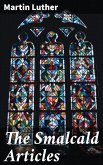Philipp Melanchthon's 'The Augsburg Confession' is a seminal work of the Protestant Reformation, serving as the primary confession of faith for the Lutheran Church. Written in 1530, this book showcases Melanchthon's precise and logical writing style, presenting the Lutheran doctrines in a clear and concise manner. The Augsburg Confession addresses theological topics such as justification by faith, the nature of the sacraments, and the role of the Church in society. It also highlights the early struggles of the Protestant movement against the Catholic Church, making it a crucial historical document of the Reformation period. Melanchthon's strategic use of rhetoric and scripture references further solidify the theological arguments presented in the book, making it a cornerstone of Lutheran theology. Philipp Melanchthon, a close associate of Martin Luther, was a prominent German reformer and humanist scholar. His background in theology and education greatly influenced his writing of 'The Augsburg Confession,' as he sought to articulate the beliefs of the Lutheran movement in a scholarly and persuasive manner. Melanchthon's expertise in Greek and Latin languages is evident in the precise wording and structure of the confession, demonstrating his commitment to academic rigor and theological accuracy. I highly recommend 'The Augsburg Confession' to readers interested in the history of the Protestant Reformation, Lutheran theology, or the development of Christian doctrines. Melanchthon's work provides valuable insights into the foundational beliefs of the Lutheran Church and the theological debates of the 16th century, making it essential reading for scholars and students of religious history.
Dieser Download kann aus rechtlichen Gründen nur mit Rechnungsadresse in A, B, BG, CY, CZ, D, DK, EW, E, FIN, F, GR, H, IRL, I, LT, L, LR, M, NL, PL, P, R, S, SLO, SK ausgeliefert werden.









